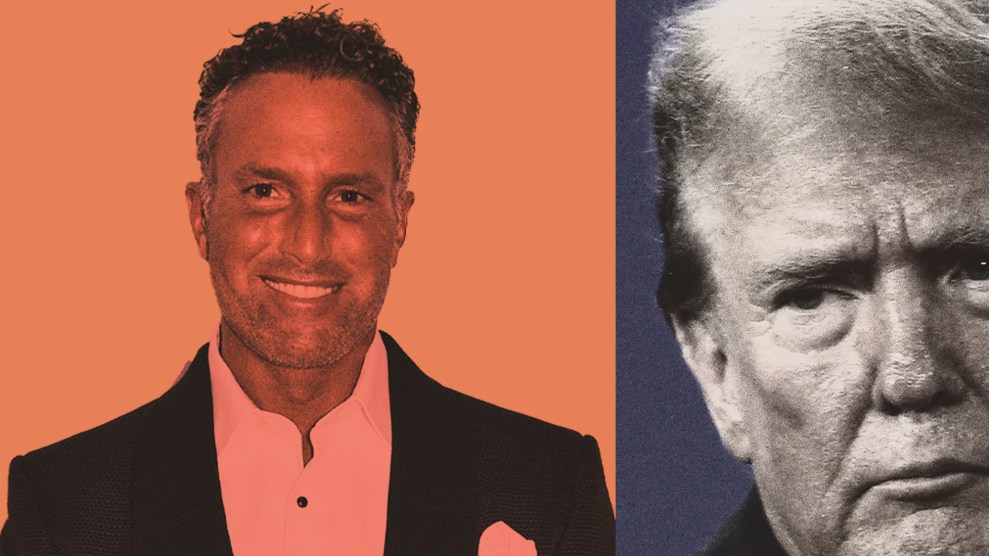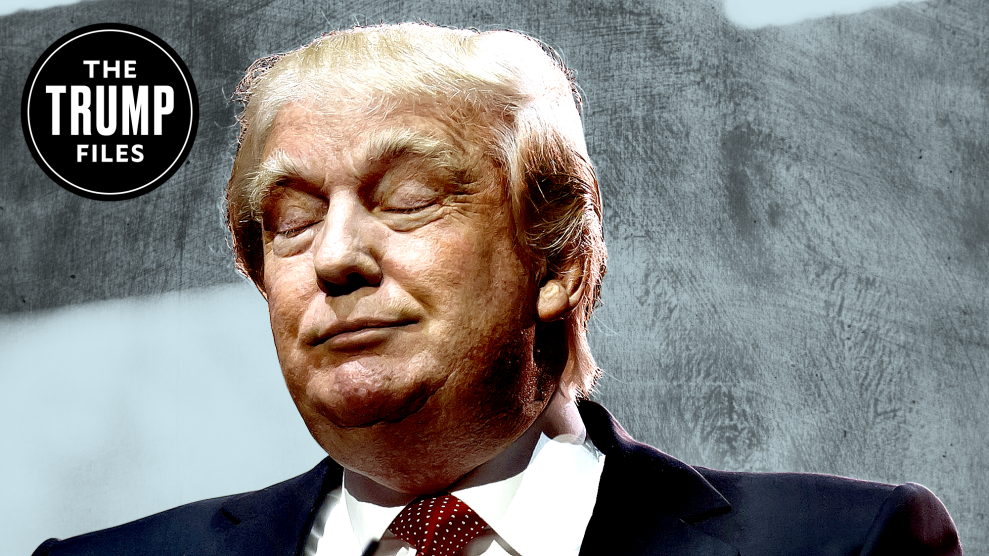
Mother Jones illustration; Rob Latour/Invision/AP; Gripas Yuri/Abaca/ZUMA
In a piece over the weekend, Washington Post reporters Amy Wang and Azi Paybarah pointed out that Donald Trump—who lately has been talking, like so many politicians before him, about targeting waste and fraud in Social Security and Medicare—granted clemency or pardons to key perpetrators of Medicare fraud while president.
Exhibit A is nursing home kingpin Philip Esformes, recently profiled by Mother Jones, who in 2019 was tried, convicted, and sentenced to 20 years in prison in connection with the most egregious stint of Medicare fraud in history, involving some $1.3 billion in bogus claims, according to the Justice Department.
The details are, in a word, wild. They involve orgies and escorts, cash kickbacks delivered in grocery bags, crooked doctors fabricating symptoms, and nursing homes selling patients’ records to unscrupulous vendors—who then billed the government for services that were either unnecessary or never provided, or both.
Morris Esformes, Philip’s late father and business partner, who built the family empire of nursing and assisted living facilities, was not directly implicated in the fraud. He had, however, been the subject of media scrutiny and official investigations for his business practices and conditions that put residents of his understaffed facilities at risk.
For example, Morris threw open the doors of his assisted living and skilled nursing facilities to younger patients with serious mental illness and addiction problems. For this, he depicted himself as a do-gooder. In fact, keeping his SNF beds fully occupied guaranteed Medicare reimbursement at the highest rates. But his facilities were not equipped to provide mental health care. As Chris Pomorski wrote in Mother Jones:
The commingling of these patients, whom SNF staffers called “walkie-talkies,” with frail seniors gave some employees pause. “We could have the 35-, 45-, 49-year-old men on very heavy psych drugs put into a room with an elderly patient that is bedbound,” Ada Maxine Ginarte, a former nurse at an Esformes skilled nursing facility, testified. These men often were visibly disturbed and could be intimidating, even to medical professionals, she added. “You could have them walking around among the little ladies in their wheelchairs.”
One former addict, Robert Dingman, testified about his time at Oceanside, one of the Esformeses’ skilled nursing facilities. “It was a good spot for a homeless person,” he said. “My drinking and drugging weren’t hindered there.” Notes Pomorski:
The facility itself was hellish, a warehouse of neglected long-term residents and younger patients with mental illness who got little treatment beyond antipsychotic drugs. “I couldn’t get drunk enough not to hear the screaming, yelling, smell diapers on the floor,” Dingman recalled.
But it was Philip who oversaw the large-scale fraud, partnering with an ever-expanding network of ethically compromised doctors and businesspeople willing to game the federal system to enrich themselves. One physician, Dr. Roberto Del Cristo, would submit sketchy referrals to make patients eligible for Medicare reimbursements. In return, Pomorski wrote, Del Cristo got “access to a pool of Esformes patients for whom he could then bill insurers, earning about $100,000 extra per year…
Other doctors—and assisted living owners—took cash kickbacks from Esformes’ lieutenants [brothers Willy and Gaby Delgado]…The Delgados paid Esformes for access to hundreds of assisted living residents and would then bill Medicare for unnecessary equipment and services, including diabetes care, intravenous injections, and mobility devices. “We are banging up all these Medicare numbers, running them like credit cards,” Gaby testified. “And I’m kicking back to Phil.”
If Trump really cared about Medicare fraud, why would he grant clemency to a man like Philip Esformes?
There are two obvious answers. The first is that Trump doesn’t care about Medicare fraud. Or perhaps he admires it, given his own record. In April 2018, for $25 million, Trump settled a lawsuit brought by New York’s former attorney general accusing him of “swindling thousands of Americans out of millions of dollars through Trump University.” Six months later, based on a lengthy investigation, the New York Times reported that “President Trump participated in dubious tax schemes during the 1990s, including instances of outright fraud.”
Last fall, of course, Trump was found liable for massive civil fraud in a case that, if the penalty is upheld on appeal, will cost him more than $450 million. (His lawyers claim he cannot afford to post a bond for that amount.) His businesses, including The Trump Organization, were found guilty of criminal tax fraud in late 2022 and fined the maximum amount allowed early last year—though the fine was still nominal.
The second obvious answer is, well, connections. Pomorski noted in his story that pardons and clemencies are typically an orderly process, with prospects carefully vetted by the Justice Department. Trump threw all that out the window. And Kushner, whose father also received a pardon, “was closely involved in Trump’s clemency decisions,” Pomorski wrote…
So was the Aleph Institute, the group that received $65,000 from Morris after his son’s arrest, and to which Kushner has ties. Kushner’s wife, Ivanka Trump, spoke in 2016 at founder Lipskar’s Shul of Bal Harbour, near Miami, and Lipskar attended a December 2019 Hanukkah ceremony at the White House. “Of the 238 total pardons and commutations granted by Mr. Trump during his term, 27 went to people supported by Aleph, Tzedek [another Jewish organization], and the lawyers and lobbyists who worked with them,” the New York Times reported. Celebrity lawyer and Trump ally Alan Dershowitz, who has volunteered with the group, told the Times that Aleph advocated extensively for Esformes’ release.
The men and women who had worked hard to put Esformes away were incensed, so much so that they decided to retry him on some outstanding charges—Esformes ultimately accepted a plea deal last month, pleading guilty to one charge of conspiracy to commit health care fraud in exchange for fines and a sentence of time served.
It was a sweetheart deal, basically, for a guy who got very rich screwing the government. Pomorski:
The clemency decision was “a kick in the teeth,” Paul Pelletier, a former federal prosecutor who supervised the early stages of the Esformes investigation, told the Times. “It sends the wrong message to crooks,” Pelletier, now in private practice, told me. “You make enough money, you can fucking buy your way out of jail. I find it appalling.”
You can read the whole story here: “Donald Trump Freed a Convicted Medicare Fraudster. The Justice Department Wants Him Back.”
















